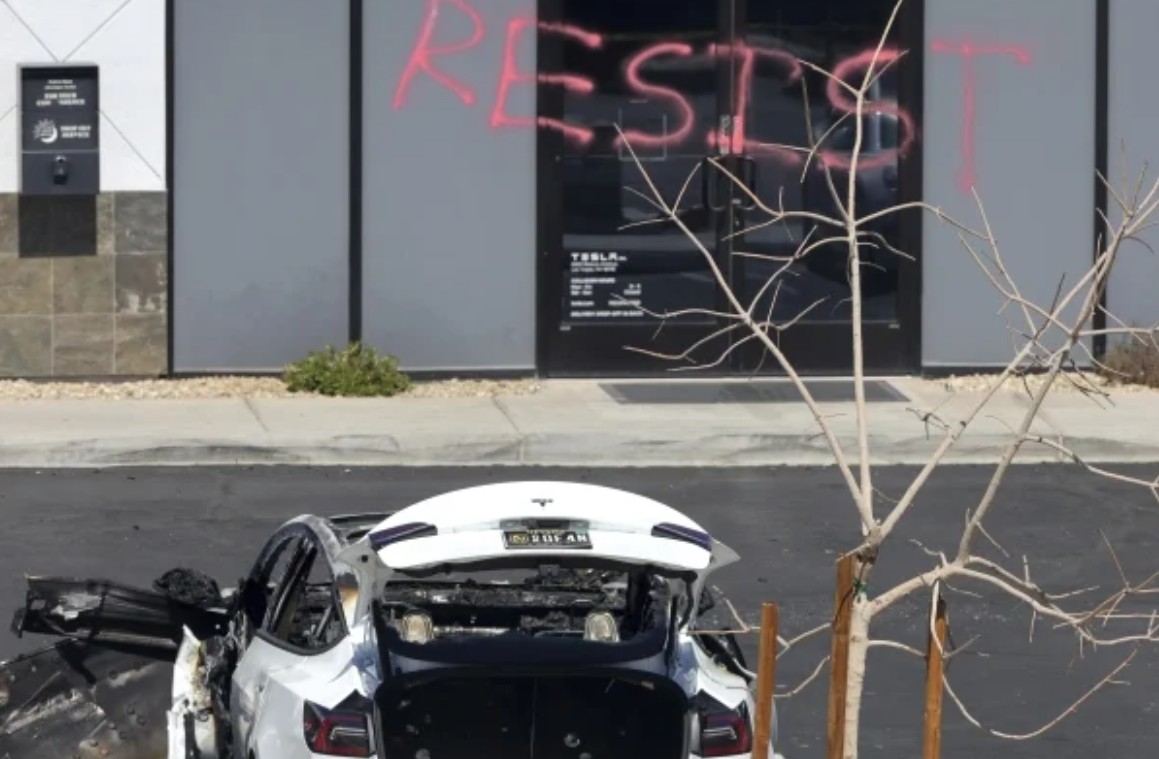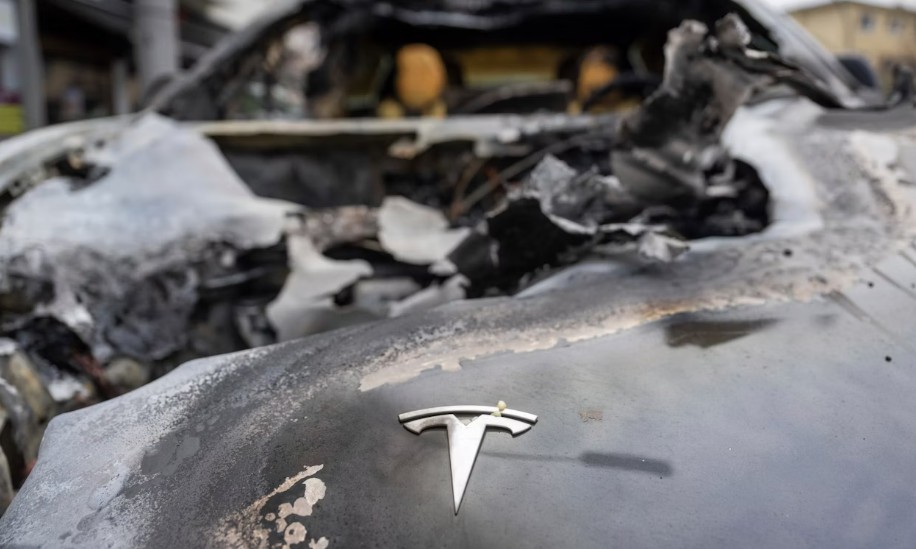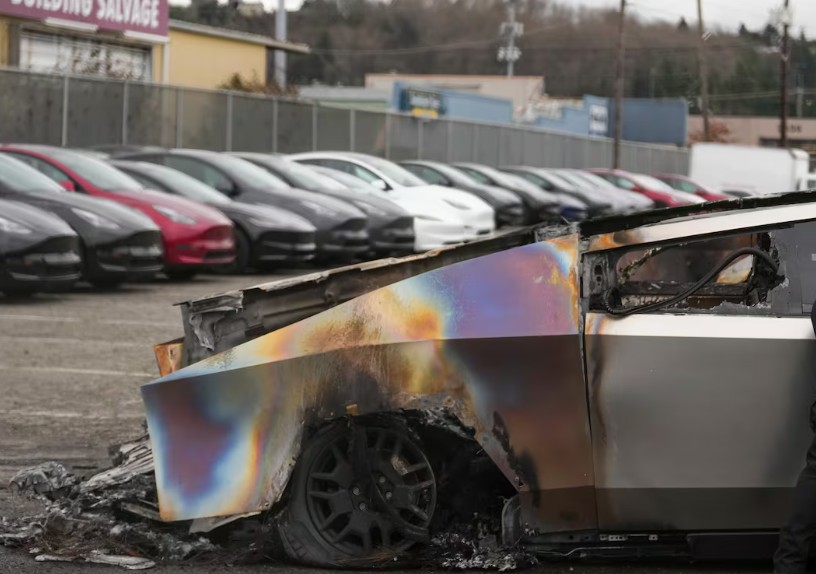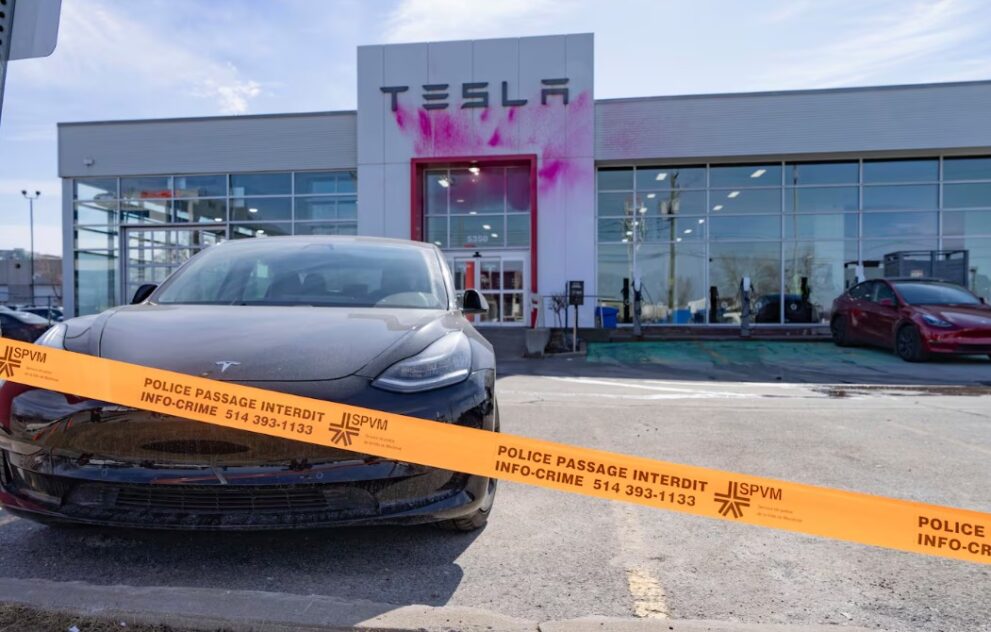Cybertrucks set on fire, bullets and Molotov cocktails at Tesla dealerships and other attacks on properties bearing the logo of Elon Musk’s electric car company are popping up across the US and abroad.
Although there are no reports of injuries, the targets are Tesla showrooms, parking lots, battery charging stations and privately owned Tesla cars.
There has been a clear increase since US President Donald Trump took office and authorized Musk to oversee a new “Department of Government Efficiency” (DOGE) that cuts federal spending. Experts on domestic extremism say it is still impossible to know whether the wave of attacks will develop into a long-term pattern.
In Trump’s first term, his properties in New York, Washington and elsewhere have become a natural site for protests. In the early days of his second term, Tesla has that role.
“Tesla is an easy target,” said Randy Blazak, a sociologist who studies political violence. “Those cars are on the streets, and the dealerships are in our neighborhoods.”
Musk’s critics have organized dozens of peaceful demonstrations in front of Tesla offices and factories across North America and Europe. Some Tesla owners, including a US senator who feuded with Musk, have vowed to sell their vehicles.
Prosecutors in Colorado charged a woman last month in connection with attacks on Tesla dealerships, including Molotov cocktails thrown at vehicles and the words “Nazi cars” spray-painted on the building.
And federal agents in South Carolina arrested a man last week who they say set fire to Tesla charging stations near Charleston. An agent with the Bureau of Alcohol, Tobacco, Firearms and Explosives wrote in a statement that authorities found documents critical of the government and DOGE in the man’s bedroom and wallet.
Some of the most prominent incidents have been reported in left-leaning Pacific Northwest cities like Portland, Oregon and Seattle, where anti-Trump and anti-Musk sentiment is strong.

An Oregon man is facing charges after he allegedly threw several Molotov cocktails at a Tesla store in Salem, then returned the next day and opened fire. In the Portland suburb of Tigard, more than a dozen bullets were fired at a Tesla dealership last week, damaging vehicles and windows. It is the second time in a week that the store has been targeted.
Four “cyber trucks” were set on fire at Tesla’s Seattle lot this month. Witnesses reported Friday that a man doused an unused Tesla Model S with gasoline and started a fire on a street in Seattle.
In Las Vegas, several Tesla vehicles were set on fire Tuesday outside a Tesla service center, where the word “resistance” was written in red on the front door of the building. Authorities said at least one person threw Molotov cocktails — bottles filled with gasoline or other flammable liquid — and fired several rounds at the vehicles.
“Was it terrorism? Was it something else? It certainly has some of the hallmarks — writing on the wall, a potential political agenda, an act of violence,” Spencer Evans, special agent in charge of the FBI’s Las Vegas office, said at a news conference.
Tesla used to be a darling of the left. With the help of a $465 million federal loan during the Obama administration, the company popularized electric vehicles and proved, despite their initial reputation, that they don’t have to be small, heavy, underpowered and with limited range.
More recently, however, Musk has allied himself with the right. He bought the social network Twitter, renamed it X and removed the restrictions that angered conservatives. He spent an estimated $250 million to boost Trump’s 2024 Republican campaign, becoming his biggest benefactor by far.
Musk continues to run Tesla and X and rocket maker SpaceX while also being an active adviser to Trump.
Tesla’s stock doubled in value in the weeks after Trump’s election, but has since lost all of those gains.

Trump gave the company a boost when he turned the White House driveway into an electric vehicle showroom. He promoted the vehicles and said he would buy an $80,000 “Model S,” eschewing the harsh criticism of electric vehicles he has voiced in the past.
Musk briefly addressed the vandalism Monday on Sen. Ted Cruz’s podcast, saying that “at least some of it is organized and paid for by left-wing organizations in America, essentially funded by left-wing billionaires.”
“This level of violence is insane and deeply wrong,” Musk wrote on his X platform on Tuesday, sharing a video of a Tesla burning in Las Vegas. The company “Tesla only makes electric cars and has done nothing to deserve these evil attacks”.
The progressive group Indivisible, which has published a guide for supporters to organize “Musk or Us” protests across the country, said in a statement that all of its guidelines are publicly available and “explicitly encourage peaceful protests and condemn any acts of violence or vandalism.”
Some Tesla owners have resorted to bumper stickers to distance themselves from the new stigma of their vehicles and perhaps deter potential vandals. The stickers read: “I bought this before we knew Elon was crazy” and “I just wanted an electric car. Sorry guys”.
Prices for used “Cybertrucks,” Tesla’s most distinctive product, have fallen nearly eight percent since Trump took office, according to CarGurus, which publishes used vehicle prices, but the rest of the market has been steady.
The White House has gone all out with Musk, the most senior member of the Trump administration and a key donor to committees that promote Trump’s political interests. Trump called the vandalism of Tesla “domestic terror,” and Trump threatened retaliation, warning that those who target the company will “go through hell.”
State’s Attorney Pam Bondi said she opened an investigation “to see how this is financed, who is behind this.”

“If you touch a Tesla, go to the dealership, do anything, you better watch out because we’re coming after you,” Bondi said Friday on the Fox Business Network. In a statement on Tuesday, she vowed to “pursue investigations that bring serious consequences,” including “those operating behind the scenes to coordinate and finance these crimes.”
Colin Clark, a senior fellow at the Soufan Center, said left-wing political violence tends to target property rather than people. He sees the rise of neo-Nazi groups as a greater security threat.
“It’s not the kind of thing I would prioritize,” Clark said of the Tesla attacks, “not right now compared to all the other threats out there.”
Teresa Ramsdell is the president of the Tesla Owners of Washington State, a club for Tesla enthusiasts, and she and her husband own three such cars.
“Hate Elon and Trump all you want – that’s fine and dandy, that’s your choice,” she said. “That does not justify the destruction of someone’s property, vandalism, burning. There are other more effective ways to make your voice heard.”
“I love my car. It’s the safest car,” Ramsdell said. “I’m not going to let anyone else judge me for the car I drive.”








